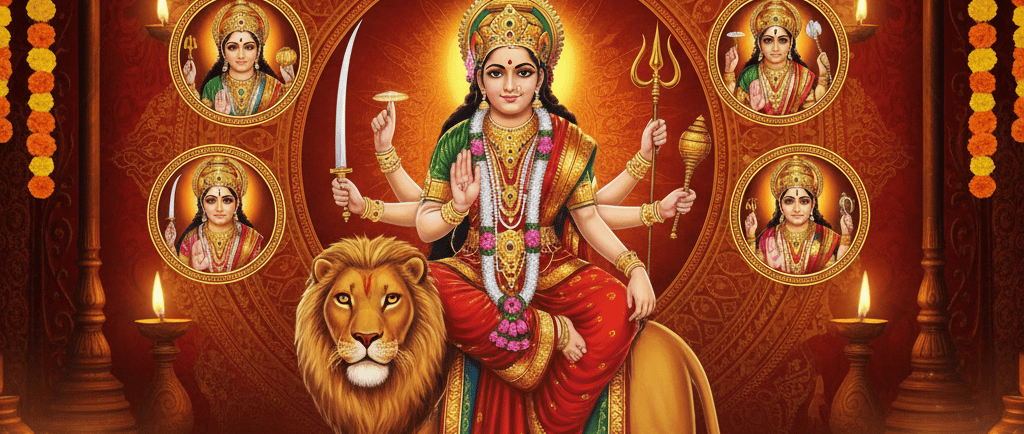Navratri: A Divine Journey Through the Nine Nights of Goddess Durga
Discover the profound significance of Navratri, the nine forms of Durga worshipped, and how to perform sacred rituals. Connect with Ghar Pooja for your divine journey.
PUJA
9/15/20252 min read


Navratri: A Divine Journey Through the Nine Nights of Goddess Durga
Every year, as the seasons change, a powerful spiritual energy sweeps across India, culminating in the vibrant celebration of Navratri. Meaning "nine nights," this auspicious festival is a profound tribute to Goddess Durga and her nine divine manifestations. It's a time of intense devotion, fasting, prayers, and colorful festivities, signifying the triumph of good over evil.
At GharPooja.com, we believe in preserving the sanctity of these ancient traditions. Join us as we explore the spiritual significance of each night of Navratri and how you can connect with this divine power.
The Essence of Navratri: Victory of Dharma
Navratri celebrates Goddess Durga's victory over the Buffalo Demon Mahishasura. This epic battle, lasting nine nights, symbolizes the eternal struggle against negativity, ego, and ignorance. Each day of Navratri is dedicated to a specific form of Durga, embodying different aspects of divine power, strength, and grace. Observing Navratri means invoking these energies to cleanse ourselves and invite positivity into our lives.
The Nine Divine Forms of Maa Durga: Day by Day
Each night of Navratri holds unique importance, dedicated to one of the nine forms of Durga. Understanding these forms deepens your spiritual experience.
Day 1: Maa Shailputri (Daughter of the Mountains)
The first manifestation, Shailputri Mata, represents nature and purity. Worshipped for strength and stability.
Day 2: Maa Brahmacharini (The Ascetic)
Brahmacharini Mata symbolizes penance, austerity, and perseverance. She inspires devotion and the pursuit of knowledge.
Day 3: Maa Chandraghanta (Adorned with the Moon)
Known for her beauty and bravery, Maa Chandraghanta establishes justice and destroys evil, bringing peace and tranquility.
Day 4: Maa Kushmanda (The Creator of the Universe)
Maa Kushmanda is believed to have created the universe with her divine smile. She blesses devotees with health, wealth, and strength.
Day 5: Maa Skandamata (Mother of Skanda)
Skandamata is the mother of Lord Kartikeya (Skanda). She represents maternal affection, purity, and wisdom, bringing salvation to her devotees.
Day 6: Maa Katyayani (The Warrior Goddess)
Born to Sage Katyayana, Maa Katyayani is a fierce form, known for her courage and as the destroyer of evil forces.
Day 7: Maa Kaalratri (The Dark Night)
Maa Kaalratri is the fiercest form, symbolizing the destruction of ignorance and darkness. Despite her terrifying appearance, she is benevolent and removes fear.
Day 8: Maa Mahagauri (The Great White Goddess)
Maa Mahagauri represents purity, peace, and serenity. Worshipping her absolves all sins and grants inner peace. This day is also crucial for Durga Ashtami rituals and Kanya Puja.
Day 9: Maa Siddhidatri (Giver of Siddhis)
Maa Siddhidatri is the giver of all supernatural powers (Siddhis) and accomplishments. She grants wisdom and spiritual enlightenment.
Navratri Rituals: How to Celebrate at Home
Performing Navratri pooja vidhi at home is a beautiful way to connect with the divine. Here’s a brief overview:
Ghatasthapana: The ceremonial establishment of a pot (ghat) representing the Goddess, usually done on the first day.
Fasting: Many devotees observe fasts, either partial or complete, for all nine days or specific days.
Daily Pooja: Offering prayers, lighting lamps (diyas), chanting mantras, and performing aarti to the specific form of Durga for that day.
Kanya Puja: On the eighth (Ashtami) or ninth (Navami) day, young girls are worshipped as manifestations of the Goddess.
Experience a Seamless Navratri with GharPooja.com
Don't let the complexities of rituals deter your devotion. At GharPooja.com, we offer expert online pooja booking services to ensure your Navratri celebrations are authentic and hassle-free.
Book a pandit online for a physical ceremony at your home.
Opt for E-Pooja if you prefer to participate virtually.
Ensure all necessary samagri and correct muhurat are taken care of.
